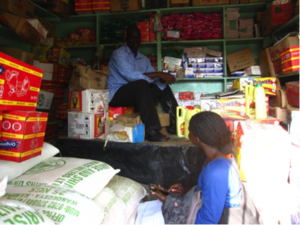The Notre Dame Initiative for Global Development (NDIGD) collected data in Northern Uganda and set up an impact evaluation baseline for the Connectivity, Electricity and Education for Entrepreneurship (CE3) project.
The CE3 project is funded by global management consulting, technology services and outsourcing company Accenture as part of the company’s Skills to Succeed corporate citizenship initiative, which is equipping more than 700,000 people with the skills to get a job or build a business and also by technology solution provider Hewlett-Packard. CE3 aims to empower disconnected communities in Northern Uganda by providing electrification solutions, Internet and communication technologies (ICT) equipment, and entrepreneurship training for local ventures. In 2013 and 2014, the first phase of the project completed the installation of self-sustaining solar microgrids and computer centers at three sites in Uganda in Pabo, Lacor, and Lira. Also completed was the first round of training and data collection in nearby regions for a monitoring and evaluation baseline analysis.
NDIGD’s Monitoring and Evaluation Director Juan Carlos Guzman and Research Fellow Chen Chen worked with 20 local enumerators to conduct the baseline survey. Over a two-week period of time, enumerators interviewed 1483 micro

businesses (0-6 employees) and small businesses (7-19 employees). Interviews were conducted with 213 businesses in the county of Amuru, 406 in Gulu, and 774 in Lira. Information was gathered on business performance, energy usage patterns and electricity provision.
This is the first attempt to survey micro and small businesses in Northern Uganda. The data fills in the blank spots in our knowledge about energy use in the region. More importantly, the baseline data provides specific knowledge about the current situation of the local infrastructure and small-scale businesses, which can help identify how and from where external assistance could best be rendered.
For the past two decades, northern Uganda has been the center of brutal violence instilled by Lord’s Resistance Army rebels, which resulted in 2 million people being displaced from their homes and tens of thousands kidnapped, mutilated or killed. In recent years, there has been relative stability in northern Uganda, but the people and communities still have limited access to electricity, connectivity and jobs, resulting in crippling isolation. Only about 15% of Ugandans have access to grid electricity, and it is only about 75% reliable for those who are connected.
Dr. Guzman highlights the findings from the baseline survey: ”Data shows a high demand for electric power from micro and small businesses. In the areas connected to the national grid, more than half of the surveyed businesses are choosing to use the grid power. In the areas out of reach of the national grid, about a quarter of them use electricity from other sources, mainly solar power or generators, even though the alternative sources usually entail either high upfront costs or high maintenance costs.” Guzman adds, “However, stable grid power is lacking in all three surveyed counties. More than 90% of the grid power users reported frequent outage.” The next phases of the CE3 project will leverage the data and knowledge gained in these small business surveys, to increase the impact of the program.
Local partners on this project have included Battery Operated Systems for Community Outreach – Uganda (BOSCO Uganda), Educate!, and the 31 Lengths Campaign.